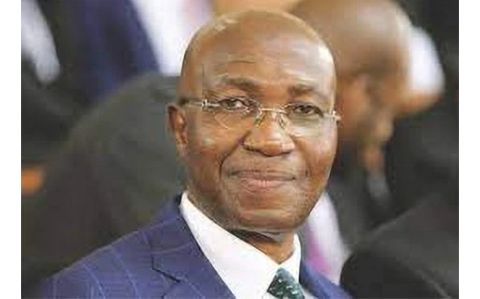Senior Advocate of Nigeria (SAN), Chief Wole Olanipekun has admonished lawyers to painstakingly read through judgments delivered by the courts before attacking the judiciary.
The visiting professor of Law Practice at the Federal University,Oye-Ekiti,(FUOYE) also decried the trend where lawyers go to television and radio houses to run down the courts.
Speaking at the sideline of the third lecture series of the Faculty of Law, FUOYE, titled, ‘ Bridging the Gap Between Theory and Practise: Effective Strategy for Using Law As a Tool for Social Justice In Nigeria’ the former President of the Nigerian Bar Association (NBA) said “it is wrong for anyone to insinuate or hold the notion that justice is being denied in Nigeria.”
Warning lawyers against pushing the judiciary to the Golgotha,the former Chairman, Body of Benchers also used the ocassion to outlined the ethical procedures for challenging court judgements.
According to him “put your observations on paper, critique and criticize them in law journals, that is what it is. You can compare what you think is right with what they do and put the two together, that is what we were taught.”
“We must not engage in self-destruct, although some social media pundits put it that Olanipekun hits the judiciary, I never did. We must stop pushing the judiciary to the Golgotha.”
“You must not kill the judiciary, I pity and sympathize with them and even me as a senior lawyer, if I have complaints I talked to them. If you have any issue particularly relating to judgments, the scholarly thing to do as a lawyer is not for you to go to television and radio houses and start lambasting the court.”
”I will not believe or agree with the notion or impression that justice is being denied in Nigeria, I believe things can be better.”
“ I delivered a keynote address at the 70th anniversary of Ibadan NBA and I was pleading with our colleagues at the bar that we must stop attacking the bench and also the bench should stop attacking the bar.”
“The most annoying thing is that some of our colleagues don’t read the judgments they are complaining about or pontificating on.”
Although, the foremost lawyer clarified that the law profession, like other human practices has its own challenges, but urged the people not to lost hope in the nation’s judiciary with assurance that things could get better.
“There is no institution manned by man that does not have its own deficiency, where you will not get minuses, where all will be pluses, it can’t be 100 percent, not even the executive or the legislature.”
“I have taken the silk since 1991 and I was called to the bar in 1976, you can’t see me after losing a case and the next thing is to go to the media, even when I know some courts are unfair to me I know where to channel by protest and reservations.”
While revealing that there is a clear difference between theory and practical law profession, the chairman Governing Council of University of Lagos explained that law must be deployed towards ensuring social justice in the society.
On the need to close the widening gap between theory and practical in law profession in attaining social justice,
the former NBA president said, “ It is pertinent and expedient for us to deliberately work towards the bridging of the gap between theory and practice of law in order to achieve the ultimate goal which it is designed for, that is, the attainment of social justice.”
“While it may be relatively easy to commit the theories to memory, the major challenge appears to lie in the application of these theories to everyday legal practice in the quest to actualise social justice, which is an indispensable aspect of the much-desired outcome.”
This lecture, therefore, attempts to traverse the philosophical realm of some legal theories, with the aim of identifying their practical application to conventional legal problems. While also considering a thematic analysis of the dominant concepts, it further seeks to identify the existing gulf between the worlds of theory and practice and drawing from personal and third party experiences, suggests modalities for bridging the identified gulf.
Olanipekun explained, “we have attempted to bring law to the doorsteps of the students in diverse fields, including civil procedure, jurisprudence, criminal law, electoral law, the law of torts, chieftaincy law, company law, the law of contract, human rights etc. In doing so, practical examples or demonstration of proceedings and decisions in our courts have been given or supplied at intervals.”
It has also been espoused that law in theory or in its abstract form, even as codified in statutes, might be a different ball game when lawyers apply their knowledge and experience to demonstrate and practicalize it in courts, resulting in landmark decisions of our various courts”
“ Law is what differentiates man from animal. Without law, life will be “solitary, poor, nasty, brutish, and short”, borrowing the profound words of Thomas Hobbes.”
He reiterated the need for a new constitution in the country, noting that, “ our constitution is too pedestrian and the earlier we do something about it, the better for us as a country.”
Olanipekun urged the FUOYE law students not to lose focus in the course of pursuing their career in the profession, assuring them that with determination and hardwork, they would make exploits in the legal practice.
Speaking, the Vice Chancellor of FUOYE, Professor Abayomi Fasina described Olanipekun as an authority in the nation’s legal profession, saying that his contributions cannot be over-emphasized.
The VC said that his appointment as the first professor of practice by the university was necessitated in view of his expertise and to serve as a motivation for students of law from the university.
Fasina said the lecture was more inspiring and educating, calling on the students not to be distracted in their journey to greatness and emulate the hard work exemplified by Olanipekun in his career.




